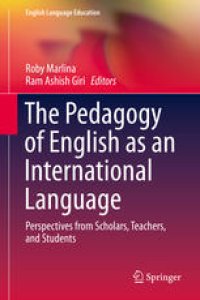
Ebook: The Pedagogy of English as an International Language: Perspectives from Scholars, Teachers, and Students
- Tags: Language Education, Learning & Instruction, Teaching and Teacher Education
- Series: English Language Education 1
- Year: 2014
- Publisher: Springer International Publishing
- Edition: 1
- Language: English
- pdf
This volume offers insights in current theoretical discussions, observations, and reflections from internationally and regionally celebrated scholars on the theory and practice of teaching English informed by a new school of thought, English as an International Language (EIL). This volume provides readers (scholars, teachers, teacher-educators, researchers in the relevant fields) with:
Knowledge of the changing paradigm and attitudes towards English language teaching from teaching a single variety of English to teaching intercultural communication and English language variation.
Current thoughts on the theory of teaching English as an international language by internationally-celebrated established scholars and emergent scholars.
Scholarly descriptions and discussions of how English language educators and teacher-educators translate the paradigm of English as an International Language into their existing teaching.
Delineation of how this newly emerged paradigm is received or responded to by English language educators and students when it is implemented. Readers have a unique opportunity to observe and read the tensions and dilemmas that educators and students are likely to experience in teaching and learning EIL.
This volume offers insights in current theoretical discussions, observations, and reflections from internationally and regionally celebrated scholars on the theory and practice of teaching English informed by a new school of thought, English as an International Language (EIL). This volume provides readers (scholars, teachers, teacher-educators, researchers in the relevant fields) with:
Knowledge of the changing paradigm and attitudes towards English language teaching from teaching a single variety of English to teaching intercultural communication and English language variation.
Current thoughts on the theory of teaching English as an international language by internationally-celebrated established scholars and emergent scholars.
Scholarly descriptions and discussions of how English language educators and teacher-educators translate the paradigm of English as an International Language into their existing teaching.
Delineation of how this newly emerged paradigm is received or responded to by English language educators and students when it is implemented. Readers have a unique opportunity to observe and read the tensions and dilemmas that educators and students are likely to experience in teaching and learning EIL.